

In the Public Interest has made exciting progress over the past few years. Our team has worked incredibly hard, so I’d like to take a step back and share what we’ve been up to.
Even I was surprised by how much we’ve accomplished. We get calls every week from organizations around the country asking for campaign help; from state and local policymakers looking for model bills or support on legislative proposals; and from journalists needing background or quotes. Just recently, a Barcelona TV station interviewed me about private prisons in the U.S. (There are zero in Spain!)
When we added it up, we found that we’ve directly helped state and local organizations in 32 states, and our research and commentary have been cited in over 150 publications, including the New York Times and Wall Street Journal, and local papers across the country like the Cleveland Plain Dealer and Bakersfield Californian.
» Read more about: Public Interest Advocates Tally Up 2015 Victories »


Chicago just took a huge step towards closing the door on irresponsible sales of public assets and reckless outsourcing of public services. Last week, the city council passed an ordinance that mandates real public review of large privatization deals and increases transparency and contractor accountability.
The Privatization Transparency, Accountability and Performance Ordinance (PTAPO) is a significant move by Chicago’s leaders to ensure meaningful accountability to the city’s taxpayers and working families.
Unfortunately for Chicagoans, the rules weren’t in place a decade ago, when then-Mayor Richard M. Daley leased the Chicago Skyway toll bridge to an Australian-Spanish private consortium for 99 years. The bridge has since become one of the most expensive toll-per-mile roadways in the U.S.
But Daley’s lease of the city’s parking meters to Wall Street in 2008 is the ultimate example of privatization gone wrong. Chicago sold the meters to Morgan Stanley at least $1 billion under their value,
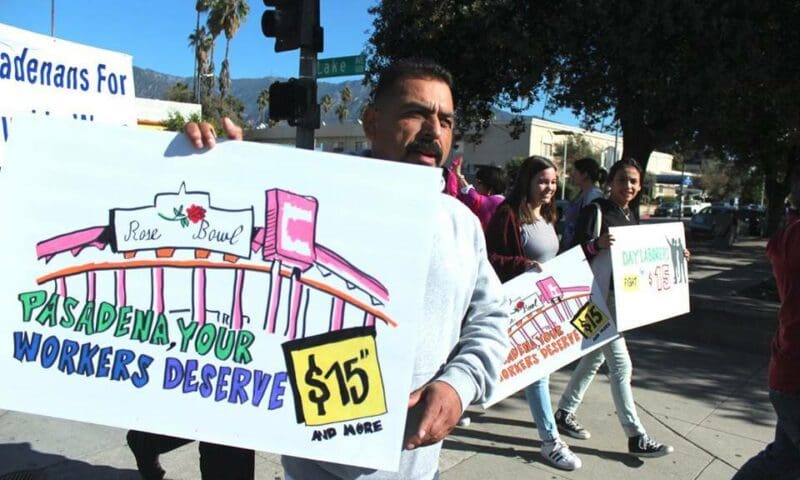
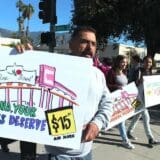
Pasadena, California — home of the annual Tournament of Roses parade and the Rose Bowl football game — is known as the City of Roses. But a broad coalition of low-income workers, middle class professionals, clergy, nonprofit leaders, educators, unions, community and civic groups, and enlightened businesses has come together to transform Pasadena into the City of Raises.
They have built a movement to urge Mayor Terry Tornek and the City Council to adopt a law raising the minimum wage gradually to $15 an hour by 2020, just as the City of Los Angeles and Los Angeles County did last summer, and other area cities (Long Beach, Santa Monica, West Hollywood and Glendale, among them) are considering.
These efforts are part of a growing national movement to improve wages and working conditions for low-wage Walmart and fast-food workers, janitors, hospital employees and others. They’ve been pushing cities to adopt minimum wage laws and pressuring big corporations to increase pay for its low-wage employees.


If legendary labor activist Joe Hill were alive today — and some contend that he is — he would have plenty to say about the state of the American worker. And the country, if it listened, would have plenty to learn.
Hill, who was executed in Utah 100 years ago this month, was an unapologetically radical union organizer whose rough-hewn songs and poems matched the brutal working conditions endured by tens of millions of Americans in the early 20th century. While his lyrics might at first sound anachronistic to contemporary audiences, their underlying spirit speaks directly to the experiences of far too many in our often unforgiving 21st century economy.
“Would you have freedom from wage slavery… Would you from mis’ry and hunger be free,” from Hill’s 1913 anthem “There Is Power in a Union,” could easily have been inspired by the thousands of truck drivers who haul goods to and from the nation’s largest port in Los Angeles.
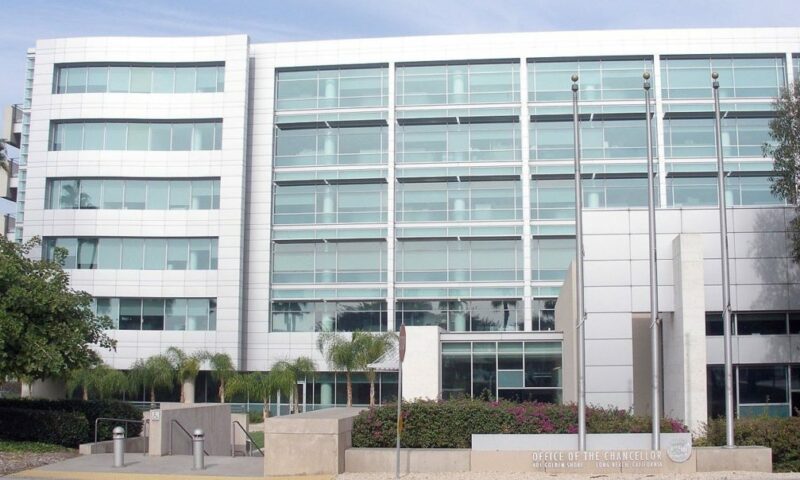

Faculty and students from the 23 campuses of the California State University (CSU) system will demonstrate today over a contract fight that they say is critical to the future of higher education in the Golden State. The actions will be highlighted by a march through downtown Long Beach, ending at the state chancellor’s office, where the CSU Board of Trustees is to meet.
The long-running conflict intensified last week, as the California Faculty Association (CFA) announced that 94 percent of its members who voted agreed to authorize a strike. Faculty have been frustrated by what they say is under-investment in teaching: stagnant wages and the CSU’s move towards cheaper part-time teachers rather than tenure-line faculty, while at the same time hiring and giving raises to non-academic supervisors and top management. Student fees increased multiple times over that period. The result, say CFA members, is that students face a tougher path to graduation,
» Read more about: Why California's State University Faculty Might Hit the Bricks »


As America’s heartland prepares for another frigid winter, low-income families in Iowa are also bracing for a significant change. That’s because private companies are scheduled to take over management of the state’s Medicaid program the first of the New Year, a shift Iowa’s governor is calling “modernization.”
Governor Terry Branstad says that concerned Iowans “should not be afraid of change,” but private management could make it harder for almost 600,000 people—about 22 percent of the state’s population—to get the health care they need.
The Des Moines Register says the current state-run program “spends less per person than the majority of other states, while still providing comprehensive coverage.” Why jeopardize that? A chaotic transition, diminished services or reduced coverage could threaten low-income families and people with disabilities.
But Iowans still have a say. The federal government has to sign off on the transition,
» Read more about: Iowa to Hand Over Medicaid to Private Companies »


November 19 marks the 100-year anniversary of Joe Hill’s execution by a Utah firing squad for a sensationalized Salt Lake City double homicide. Hill, a 36-year-old Swedish immigrant, was an itinerant laborer and union organizer for the Wobblies – the Industrial Workers of the World (IWW). Today most historians view Hill’s arrest as a police frame-up and consider his trial and execution as, at the least, a politically motivated miscarriage of justice, if not outright judicial murder.
Hill’s mythic stature continues to serve as the soul of the struggle for workers’ rights and economic equality, and interest in his life shows no sign of abating — a phenomenon that is reflected in the ongoing yearlong series of exhibits, book events and concerts commemorating his death.
Joe Hill, of course, was no ordinary organizer but also a poet and balladeer whose knack for taking a well-known hymn or folksong,


If you would like to help lift thousands of Pasadena families out of poverty, please join us on Saturday as we march to urge Pasadena’s mayor and city council to adopt a $15/hour minimum wage (gradually by 2020), then adjust it annually for inflation — similar to the law that the City of Los Angeles and L.A. County (for unincorporated areas) adopted in June.
What:
March from Pasadena Community Jobs Center to Central Park and rally to raise the wage and abolish wage theft.
When:
Saturday November 14, 9 a.m.
Where:
Begin at Pasadena Community Jobs Center, 500 N. Lake Avenue, Pasadena
(Click on event flyer)
Since L.A. adopted its minimum wage law, a number of other cities in L.A. County (including Long Beach, Santa Monica, West Hollywood, Glendale and others) are considering doing the same.
» Read more about: Saturday Rally Targets Pasadena Minimum Wage »
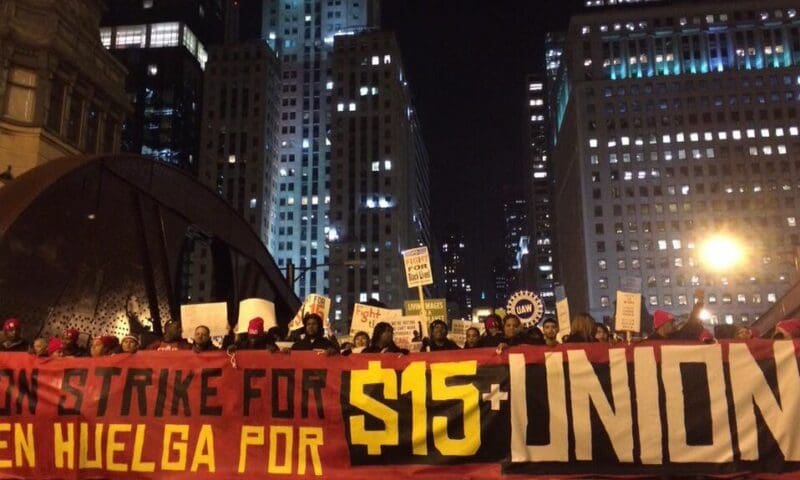

Last night’s Republican debate got underway following a day of national demonstrations in favor of raising the American minimum wage to $15 an hour — a day of protest accompanied by nothing-to-lose strikes by fast-food workers. The debate began with a question about raising the minimum wage. The first candidate to speak said America’s wages were, in fact, “too high” and that the current federal minim wage of $7.25 has to stay where it is.
The second presidential hopeful argued that the reason there are high unemployment rates among young African Americans is “because of those high wages.” The next candidate followed by calling the minimum wage “a disaster” for the 20th century and predicted catastrophe for the 21st should the day come when higher wages “make people more expensive than a machine.”
For a moment it looked as though the debate would become a contest to see which candidates would lower the minimum wage the most.
» Read more about: Not Debatable: Minimum Wage Movement Gains Ground »
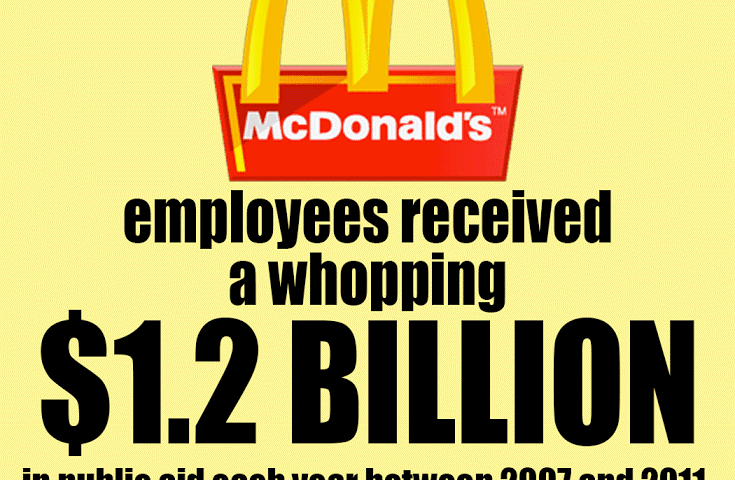
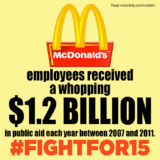
On Tuesday, November 10, Los Angeles and Long Beach will join the National Day of Action built around #FightFor15. Its message, which has been spreading since last April’s Tax Day demonstrations, will be announced loud and clear in 270 cities: Fast-food and other low-income workers in America deserve a break today – a national $15 hourly wage and the ability to organize into unions.
That is why fast-food workers will be walking off their jobs in a nationwide strike tomorrow. To learn what other actions are taking place across California, please check out Fight For 15’s website and its Facebook page.
In case you may think that comparatively few workers actually earn the minimum wage or would directly benefit from the proposed wage boost, consider this: According to a study from the National Employment Law Project, 42 percent of Americans earn less than $15 an hour.
» Read more about: Fight for $15: A Big Movement Gets Bigger Tuesday »


High rent and low wages are squeezing poor and low-income families across California, including those living in its capital. But the Sacramento City Council’s actions on both economic issues are weak, some progressive critics say.
“The city caters to the continued gentrification of downtown,” Bob Erlenbusch, executive director of the Sacramento Regional Coalition to End Homelessness, said in an email to Capital & Main. “That is underpinned by market-rate housing surrounding the new arena.”
The vast majority of Sacramento’s low-income residents live outside the revitalized central city.
In 2014 the Sacramento City Council threw its political weight (without a public referendum) behind Golden 1 Center, the new $507 million downtown arena that is the future home of the Sacramento Kings basketball team. This September the council approved a plan for the city to issue $272.9 million in bonds,
» Read more about: Housing and Wages: The Sacramento City Council's Weak Half-Measures »
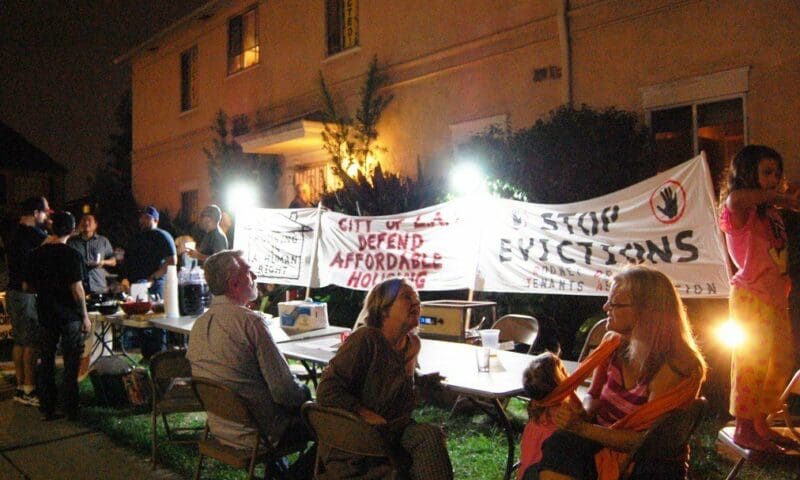

It’s just after dusk on a recent Friday in Los Angeles and already the streets of Los Feliz Village are bumper-to-bumper with the inflow of weekend diners, cocktail loungers and movie- and theatergoers along its main drag, Vermont Avenue.
Apart from being a nightlife hub, the neighborhood boasts highly rated public schools, a very good public library, a still-thriving bookstore and even a good sidewalk newsstand. And they’re all within leisurely walking distance from the single-family Craftsmans, California bungalows and modestly scaled courtyard apartment buildings that line its shaded streets.
Within a stone’s throw of Vermont are is a somewhat nondescript postwar courtyard complex at 1655 Rodney Drive. Though a bit weathered and overgrown on the outside, inside its dozen rent-controlled units are spacious and neatly kept. Its longtime, largely middle-aged gay residents pay around $800 to $1100 a month.
In a city notorious for its atomized sprawl,
» Read more about: Los Feliz Tenants Fight Evictions With Protest Parties »
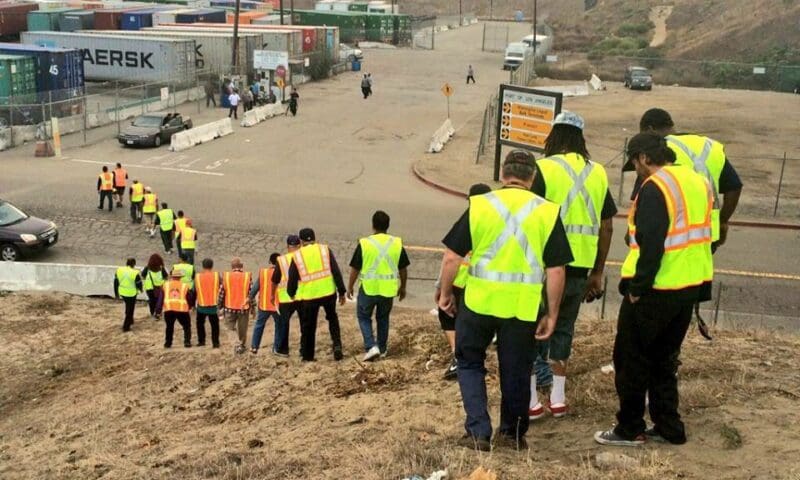

Two days ago, with truck driver strikes expanding at Los Angeles-area ports, Capital & Main shared a conversation with a pair of drivers who detailed safety concerns about a trucking system that imposes long hours and unaffordable maintenance burdens. As the strikes spread among trucking companies and into port warehouses, those safety concerns took center stage with a shocking accident.
Bicyclist Killed
On Tuesday afternoon a shipping container slipped from a truck and killed a bicyclist in Carson. The container had struck a railroad bridge, though a witness said that the truck may not have been appropriate for the job.
“I’m assuming that they’re hiring those flatbeds because yesterday it was a flatbed too,” David Alva told ABC7 News. The day before, Alva saw a similar accident that did not involve injuries. “Those containers weigh from 40,000 [pounds] and up. They just strap them on with straps,
» Read more about: Port Truck Strike Spreads to Warehouses »


“I want this message to be loud and clear: Until Pacific 9 reclassifies its workers, until they return our wages, until they obey the law, we will not stop the fight.”
– Amador Rojas, port truck driver
As Capital & Main reported yesterday, drivers with one of the larger trucking companies serving the ports of Los Angeles and Long Beach went on strike just before dawn Monday. They struck XPO Logistics, a major international freight transportation company, while at the same time other drivers picketed Pacific 9 Transportation as they entered the 15th week of a strike against that company.
These drivers are on the front lines of a critical fight impacting the future of work in the United States. “Misclassification,” a condition in which companies wrongly treat their workers as “independent contractors” rather than as employees, is a growing problem that is receiving increasing attention.
» Read more about: Striking Port Truck Drivers Dig in Against Wage Theft »


Truck drivers at the ports of Los Angeles and Long Beach will begin a strike at 6 a.m. today against local subsidiaries of XPO Logistics, a Connecticut-headquartered freight transportation company. The drivers are taking the action because they say that XPO misclassifies them as independent contractors rather than as employees – a practice that allows companies to claw back pay, duck labor standards and pass vehicle maintenance costs onto drivers.
Misclassification policies amount to wage theft, according to labor advocates and increasingly one-sided rulings by courts and regulatory agencies. Studies have found that between 10 and 20 percent of employers misclassify at least one employee in nearly every American industry, from construction to home care to janitorial services to transportation.
At the same time that XPO’s drivers will be walking picket lines, drivers protesting similar treatment from Pacific 9 Transportation, another freight-hauling company servicing the ports, will enter the 15th week of a strike against that business.
» Read more about: Bulletin: Port Truck Drivers Strike Over Wage Theft »


Earlier this month our team from Jobs to Move America (JMA) attended the American Public Transportation Association (APTA) Annual Meeting in San Francisco. We were there to learn the latest in transit trends, from sustainability planning to high-speed rail. We were also an outspoken advocate on behalf of American labor and taxpayers amongst 1,500 attendees. Unfortunately, even with the presence of the Department of Transportation (DOT) and the Federal Transit Administration (FTA), domestic labor was largely left out of the conversation, since most participants were public transit officials, manufacturing company representatives, and private sector consultants focused on stretching the dollar.
Despite this bottom-line focused crowd, we were encouraged by the plenary session’s appearance of DOT Secretary Anthony Foxx. He argued that with the right configuration, transportation can connect workers to sustainable jobs and living wages, and transportation as an industry can also generate employment opportunities for disadvantaged Americans seeking second chances.
» Read more about: Making Public Transportation Work for America's Job Seekers »


Sue Poucher, 64, is a Navy veteran from Michigan who joined the paid workforce at age 18, and left it in April 2014, due to a lack of job openings in her field, retail sales. She was one of 200 people who attended a daylong conference in Sacramento Oct. 15. The gathering, called “Tomorrow’s California: New Visions for Retirement Security,” focused on the release of a new report on aging, economics, public resources and policy solutions.
“I get Cal-Fresh, live in U.S. Housing and Urban Development subsidized senior housing and rely solely on my $943 monthly Social Security check,” Poucher told Capital & Main at the conference. “When food prices go up, what are you supposed to do, not eat?”
Nearly two-thirds of California’s private-sector workers lack employer-sponsored retirement plans.
The Sacramento resident has no savings to fall back on,
» Read more about: Conference Sees Hard Road for Retiring Californians »


You wouldn’t hand your laptop to a hacker, right? Well, the Senate could make a move just as foolish. They’ll soon vote on nominations to the U.S. Postal Service (USPS) Board of Governors and the nominees include a longtime advocate for postal service privatization and a lobbyist for the payday lending industry.
The Internet has changed how most of us communicate, but mail remains a central part of our communications infrastructure. A public postal service supports democracy and commerce by providing affordable mail service to everyone, rich or poor, in all areas of the country. It also nurtures marginalized communities by providing access to good jobs and career advancement.
Despite being under attack, including by the absurd requirement to “pre-fund” the next 75 years of its retiree health benefits in a 10-year span—a demand not made of any other federal agency or any well-run private company—the USPS has remained a vibrant public service.
» Read more about: Payday Loan Lobbyist Nominated to Postal Board »


California’s senior population is expected to increase by 64 percent in the next two decades, and most will be financially unprepared for retirement. This is according to a report from researchers at the University of British Columbia and the University of California, Berkeley. Their study, Aging California’s Retirement Crisis: State and Local Indicators, was commissioned by California Retirement Security for All and projects population expansions among seniors to be felt most in the Los Angeles and Central Valley regions, with economically vulnerable Latinos, African-Americans, women and renters accounting for an increasing share.
“Our study clearly shows a mounting retirement crisis in California, and with the threat of poverty in the senior years falling hardest on people of color, workers in low-wage jobs, women, and immigrants,” said the report’s editor, Dr. Nari Rhee of the Retirement Security Program at U.C. Berkeley.
The report was introduced today at a Sacramento conference called “Build Tomorrow’s California: New Visions for Retirement Security,” attended by community advocates,
» Read more about: Uncertain Times Ahead for California's Aging »


Traveling to and from Israel to take care of his cancer-stricken dad caused Ari Gottlieb to leave a full-time job in sales. As a result, the 37-year-old Los Angeles resident sought “on-demand” employment as an Uber ride-share driver in March 2013. Gottlieb told Capital & Main by phone that he provided nearly 3,000 rides to Uber customers before the company permanently “deactivated” (e.g., fired) him in August 2014.
Deactivation severs drivers’ connection to Uber’s app-based platform. Without that digital access to passengers, drivers are unable to earn income.
“The company contended that I was canceling customer requests for rides,” Gottlieb said. “It was true, but I didn’t have a choice, due to traffic, where I was and the location of the request. I hoped that the customers got a closer driver. Spending 30 minutes driving for a one or two-mile Uber customer trip didn’t make sense.”
Gottlieb labored as an independent contractor,
» Read more about: A Clash of Conveniences: Uber’s "Deactivation" of Drivers »